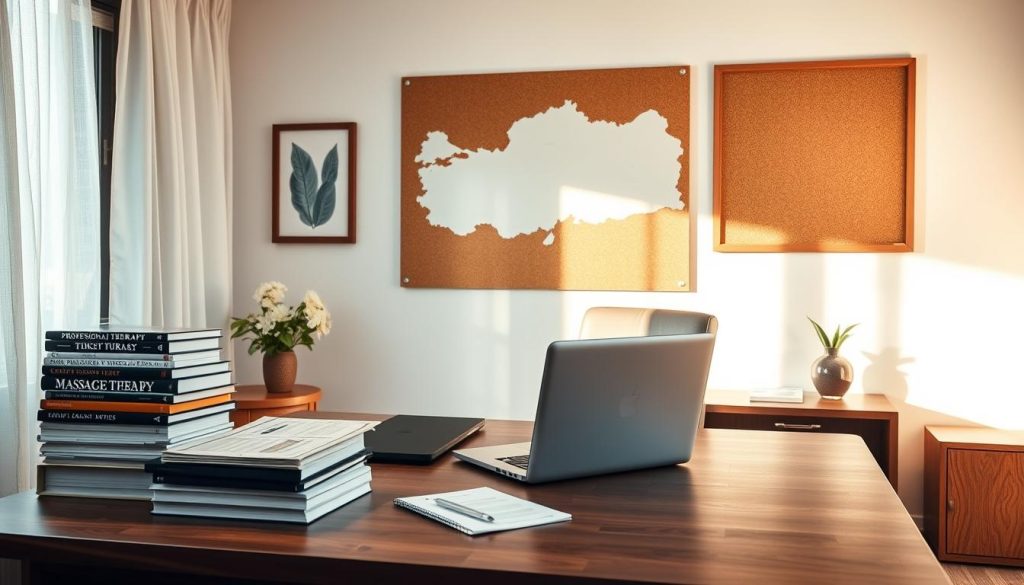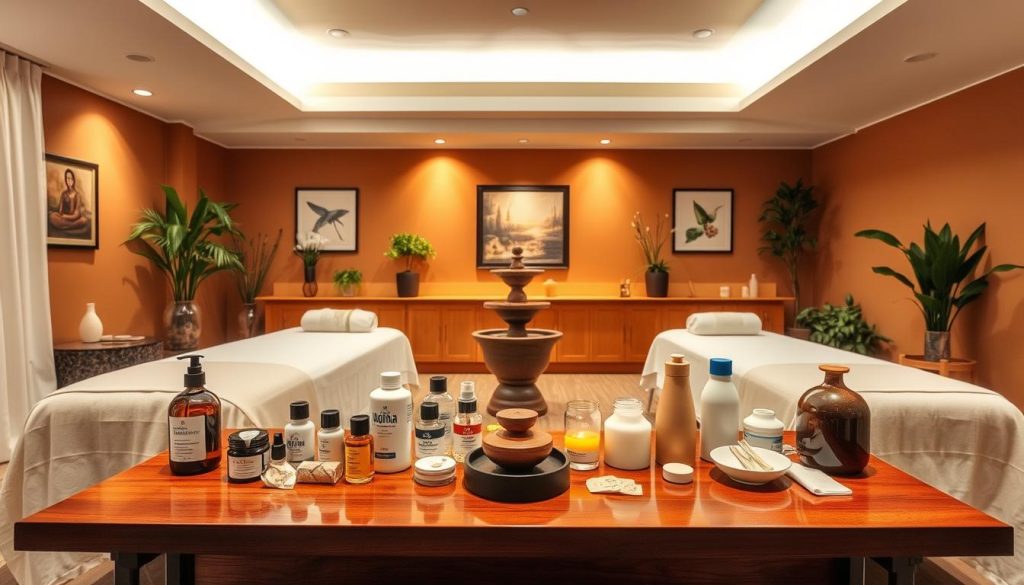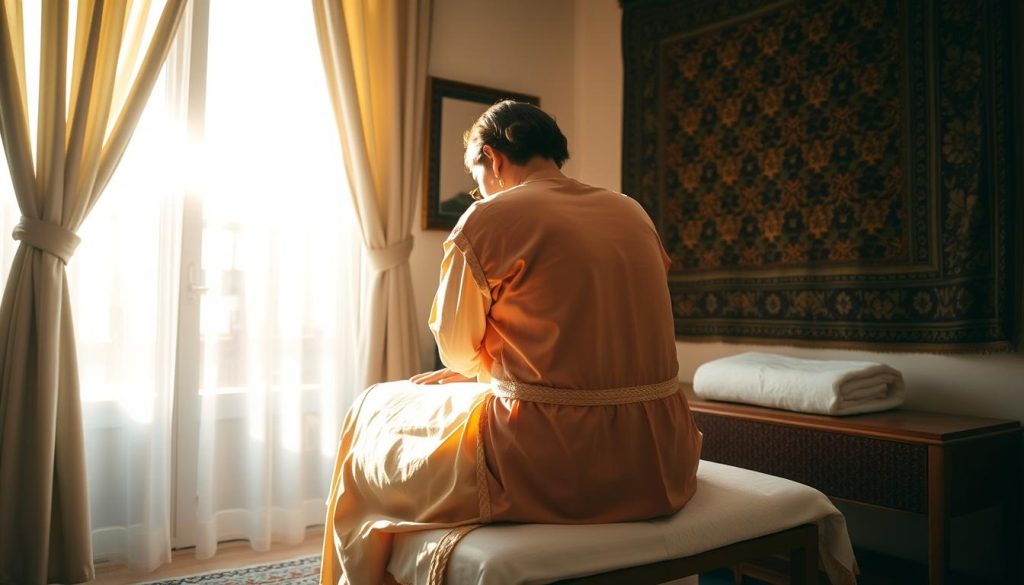Ever wondered why some massages leave you refreshed while others barely make a difference? In Turkey’s booming wellness tourism sector, picking the right massage therapist makes all the difference. With unique cultural practices and strict licensing rules, your selection impacts both safety and results.
Turkey blends ancient techniques with modern therapies, attracting visitors seeking relaxation or rehabilitative benefits. Coastal regions especially see high demand for sports massages. Yet unlicensed practitioners in tourist hotspots risk your health.
This guide simplifies your search. Learn six key factors for selecting professionals, from verifying Turkish massage licenses to understanding traditional methods. Whether you’re a resident or traveler, proper selection ensures optimal wellness outcomes.
Key Takeaways
- Turkey’s massage industry combines traditional and modern techniques
- Licensing requirements differ from other countries – always verify credentials
- Tourist areas have higher risks of unlicensed practitioners
- Sports and rehabilitative therapies are growing in coastal regions
- Proper selection impacts both safety and treatment effectiveness
- Cultural norms influence massage practices in Turkey
Understanding Your Massage Needs and Goals
Turkish wellness traditions offer diverse solutions when aligned with individual needs. Whether seeking stress relief or injury recovery, defining objectives ensures optimal results. This process involves both personal reflection and professional guidance.
Consider keeping a health journal for two weeks before booking. Note pain patterns, stress triggers, and mobility challenges. This creates concrete data for your therapist consultation.
“Turkish massage therapy bridges ancient wisdom with modern science. The right approach combines cultural techniques with evidence-based outcomes.”
Identifying Health and Wellness Objectives
Start by categorizing primary needs. Common focus areas include:
- Chronic pain management (back, neck, joints)
- Post-surgical rehabilitation
- Sports performance enhancement
- Stress and anxiety reduction
Pregnant travelers should verify clinic safety protocols. Turkish prenatal massage often incorporates special bolster techniques. Always share medical history with practitioners.
Determining the Right Massage for You
Turkey’s unique offerings require careful matching to conditions. Below compares popular options:
| Type | Best For | Turkish Variations |
|---|---|---|
| Sports | Muscle recovery | Football-specific protocols |
| Hamam | Detoxification | Marble slab exfoliation |
| Aromatherapy | Stress relief | Local lavender blends |
| Deep Tissue | Chronic pain | Ottoman pressure techniques |
Athletes might prefer sports therapy along coastal resorts. Those with desk jobs often benefit from neck-focused sessions. For comprehensive guidance, review this wellness matching guide.
Medical conditions require extra caution. Always consult physicians before massage if you have:
- Recent fractures
- Blood clotting disorders
- Uncontrolled hypertension
Licensed professionals follow strict documentation for insurance cases. Learn more about medical massage qualifications in Turkey.
Researching Potential Masseuses
Finding the right professional starts with thorough research and trusted sources. In Turkey’s wellness landscape, credible therapists stand out through verifiable credentials and consistent client feedback.

Leveraging Personal Recommendations and Online Reviews
Start by asking friends or family for recommendations. Personal experiences often highlight therapists who excel in specific techniques.
Online reviews add another layer of insight. Platforms like Google and Yelp reveal patterns in client satisfaction. Look for:
- Consistent praise for professionalism
- Detailed descriptions of results
- Responses from the business addressing concerns
“Authentic reviews often mention specific techniques or outcomes. Vague praise may indicate fabricated feedback.”
Exploring Local Spas, Clinics, and Wellness Centers
Verify credentials before visiting. Reputable clinics display certifications like ISO 9001 or membership in the Türkiye Masaj Terapistleri Derneği.
Compare options using this table:
| Facility Type | Pros | Cons |
|---|---|---|
| Hotel Spa | Convenient for travelers | Higher prices |
| Independent Clinic | Specialized therapies | Varies by location |
| University-Affiliated Center | Evidence-based methods | Limited availability |
For deeper insights, learn how to spot a top-notch massage therapist through professional networks.
Evaluating a Masseuse’s Qualifications
Credentials separate skilled therapists from amateurs in Turkey’s wellness industry. Proper vetting ensures safety and maximizes therapeutic benefits. Focus on two pillars: certifications and hands-on expertise.
Checking Credentials and Professional Certifications
Turkey’s SAĞLIK BAKANLIĞI (Health Ministry) regulates massage licensing. Look for these key indicators:
- Temel Diploma: Basic 500-hour training, covering anatomy and kinesiology.
- Uzmanlık Diploma: Advanced certification for specialties like sports or medical massage.
- MYK (Mesleki Yeterlilik Kurumu) verification for hourly benchmarks.
“International certifications like CIBTAC are respected, but always verify local accreditation first.”
Compare common certification types:
| Certification | Scope | Duration |
|---|---|---|
| Temel | Fundamentals | 500 hours |
| Uzmanlık | Specialized techniques | 750+ hours |
| NCBTMB | International standard | Continuing education |
Assessing Years of Experience and Specializations
Experience isn’t just about years practiced—client volume and niche focus matter. Ask:
- How many clients with similar needs have they treated?
- Do they document before/after cases for conditions like post-operative recovery?
- Are they fluent in your language for clear communication?
For deep tissue or rehabilitative work, prioritize therapists with hospital affiliations. Explore advanced massage therapy training programs in Turkey.
How to Choose a Masseuse Based on Personal Preferences
Personal comfort plays a crucial role in maximizing your massage benefits. In Turkey, cultural norms and individual preferences shape the ideal therapist-client dynamic. These factors determine whether you leave relaxed or distracted.

Aligning Gender and Communication Expectations
Turkish wellness centers respect client preferences while maintaining professional standards. Consider these aspects:
- Gender preferences: Many facilities offer male and female therapists. Traditional hamams maintain gender-separated areas.
- Non-verbal cues help when language barriers exist. Over 75% of therapists in tourist areas understand basic English.
- Session lengths typically run 60-90 minutes. Extended 120-minute options exist for comprehensive treatments.
“Therapists adapt their pressure and pace based on client feedback. Clear communication ensures optimal results.”
Optimizing Location and Scheduling
Convenience impacts your ability to maintain regular sessions. Evaluate these practical elements:
| Option | Advantage | Consideration |
|---|---|---|
| City Center Clinics | Public transport access | Limited parking |
| Resort Spas | Beachfront relaxation | Higher seasonal rates |
| Mobile Services | Hotel/home visits | Equipment limitations |
Peak seasons (June-August) require advance bookings. Coastal areas see highest demand. For flexible options, explore Istanbul’s multilingual therapist directories.
Cultural sensitivity matters in traditional settings. Most hamams provide separate hours or sections for different genders. Verify policies when booking.
Practical Considerations Before Booking
Booking a massage in Turkey requires attention to practical details that impact your experience. Financial and logistical factors often determine whether your service meets expectations. Addressing these elements upfront prevents surprises and enhances results.
Understanding Costs and Session Options
Prices vary significantly based on location and session options. Luxury resorts typically charge premium rates, while neighborhood clinics offer affordable alternatives. Always confirm what’s included in quoted prices.
| Service Type | Average Cost (TRY) | Time Included |
|---|---|---|
| Resort Spa | 800-1500 | 60-90 minutes |
| Urban Clinic | 400-700 | 45-75 minutes |
| Mobile Therapist | 600-1000 | Travel time extra |
SGK (Turkish social security) may cover treatments with proper documentation. Always ask about:
- Insurance billing procedures
- Package discounts for multiple sessions
- Additional fees for specialized techniques
Clarifying Logistics and Cancellation Policies
Prepare for your appointment by asking key questions:
- Parking availability or public transport access
- Recommended attire for different modalities
- COVID-19 safety measures in place
“Late arrivals often receive shortened sessions. Respecting time policies ensures you get full value.”
Cultural norms matter in Turkish wellness spaces. Most facilities provide:
- Post-session tea service
- Designated rest areas
- Translated medical history forms
Tipping etiquette varies. Resort staff typically expect 10-15%, while clinic therapists may decline gratuities. For more on maximizing your massage service benefits, review our insider guide.
Conclusion
Selecting the ideal therapist transforms your wellness journey in Turkey. Verify credentials, prioritize comfort, and align sessions with your goals for the right massage experience.
Regular sessions offer lasting benefits, from pain relief to stress reduction. Treat it as a long-term investment in your health, especially for chronic conditions.
Avoid unlicensed beach practitioners. Authentic Turkish therapy blends tradition with safety protocols. Cultural immersion enhances results—opt for hamams or clinics with certified experts.
Prepare for your first visit: confirm credentials, wear comfortable attire, and communicate needs. For peace of mind, bookmark resources to report unlicensed activity. A qualified therapist ensures a rewarding experience every time.
FAQ
What should I consider when identifying my massage needs?
How do I find a qualified massage therapist in Turkey?
Why are credentials important when selecting a therapist?
Should gender and communication style influence my choice?
What practical factors should I check before booking?
How do I know if a massage therapist specializes in my needs?
Can I request a trial session before committing?
Source Links
- https://laamawellness.com/the-ultimate-guide-to-choosing-your-perfect-massage-tailoring-therapies-for-individual-needs/
- https://innovaintegratedwellness.ca/how-to-choose-the-right-type-of-massage-therapy-for-your-needs/
- https://flourix.ca/how-to-choose-the-right-massage-for-your-needs/
- https://decompressmassagetherapy.com/blog/choosing-massage-therapist
- https://www.amtamassage.org/state-regulations/credentials-massage-therapy-profession/
- https://www.camtc.org/requirements-to-certify/
- https://mvtherapy.ee/en/blog/36.html
- https://www.takingcharge.csh.umn.edu/how-can-i-find-right-massage-therapist
- https://rosedalemassage.co.uk/5-reasons-for-a-private-massage-therapist/
- https://www.gotknots.ca/7-reasons-to-choose-a-male-massage-therapist/
- https://www.moveo.ca/things-consider-before-booking-session-with-massage-therapist/
- https://www.dairycareaction.org/relaxing-massage/
- https://clustercomputing.org/tips-to-choosing-a-good-massage-therapist/
- https://balanceonbuffalo.com/blog/licensed-massage-therapists-vs-masseuses-understanding-the-differences






